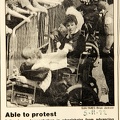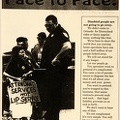New York Times, National, Thursday October 10.1991
Title: Militant Advocates for Disabled Revel in Their Roles as Agitators
by Steven A. Holmes, special to the New York Times
[compare with ADAPT 673]
Boxed text: Forcefully trying to change images of the nation’s disabled.
ORLANDO, Fla., Oct. 6 — The melee‘ at a meeting of nursing home representatives here was, in many ways, a typical for the demonstrators: After smashing their wheelchairs into police barricades and blocking a hotel entrance, 73 of them were arrested, creatmg front page headlines and a successful day's work for Adapt, the militant advocacy group for the disabled.
The aim of the action today at the Peabody Hotel in this resort city was to focus attention on the organization's call to divert Federal money from nursing homes to a form of in-home care. But the means the group uses, like Sunday's chaotic demonstration, have often exasperated its allies as much as its adversaries.
But even those who criticize Adapt acknowledge that the searing images of people with physical limitations engaging in civil disobedience often succeed in shattering stereotypes of how meek and pliant “cripples” are supposed to act, stereotypes often held by many disabled people themselves.
“Adapt is about the issue," said Mary Johnson, editor of the Disability Rag, a weekly magazine that is devoted to disability issues. “But it is also about showing you that though you are disabled you have power already. For people who feel they don't have any power, who are often dependent, that is such a liberation."
The Denver-based group's style has drawn its share of criticism from other advocates for the disabled. These critics note that the group played little part in the negotiations that led to the passage of the Americans with Disabilities Act and that their methods had often antagonized allies in the stniggle.
“I think they do get attention," said a Washington-based disabled advocate who asked not to be identified. “But that's true when they are playing to an audience that is not politically sawy. For people out in Middle America, sitting in front of the TV, seeing people in wheelchairs demonstrating is something new. But to folks in Washington who are used to sit-ins, it's passe."
[Subheading] An Effective Weapon
But leaders of Adapt, which originally stood for Americans Disabled for Accessible Public Transportation, say it is `groups` like theirs that push others to press forcefully ior expanded rights for the disabled. “l think that even for the people with disabilities who don't participate directly in Adapt, we give them heart," said Diane Coleman, an Adapt organizer from Tennessee.
And even those who sometimes criticize Adapt acknowledge that it is an eiiective weapon. lt is a role Adapt readily takes on. "We make all the other `groups` seem real rational," said Mike Auberger, one of Adapt’s founders.
The group was begun in I983 in Denver by people who worked to persuade the city to make all local buses accessible to people in wheelchairs. Over the next few years they held protests over the issue of accessible public transportation in Cincinnati, St. Louis, Phoenix; Detroit and Atlanta.
In addition to picketing, the protesters often would lock their wheelchairs together in front of city buses or chain themselves to a bus’s bumper. Early on, Adapt made a prime target the American Public Transit Association, a group representing mass transit systems. The protesters disrupted meetings and harassed officials of the group. “You have to have a bad guy in political organizing, somebody you can go after," said Mr. Auberger.
These days that role is filled by the nursing home industry and Louis W. Sullivan, Secretary of Health and Human Services. After Congress passed the Americans with Disabilities Act last year, requiring that all new buses be equipped with hydraulic lifts for people in wheelchairs, Adapt began protesting for Federal subsidies for personal attendants, individuals hired by those with physical impairments to help them with basic everyday needs.
Adapt wants 25 percent of the more than $20 billion paid to nursing home operators under the Medicaid program to be diverted from nursing homes to help the disabled pay for personal attendants. Though many mainstream proponents of help for the disabled have endorsed the goal of government subsidies for attendants, the diversion of funds sought by Adapt is opposed by the American Health Care Association, the trade group for nursing homes, and by the Bush Administration.
As a result, Adapt has spent the last few months harassing the nursing home association and “Mr. Sullivan. This spring they blocked his car during a visit to Chicago and heckled him in a speech in Washington. in August, a handful of Adapt members rolled their wheelchairs along side Mr. Sullivan and harangued him as he took part in a fitness walk on Martha's Vineyard.
Whether such methods will achieve Adapt‘s stated goals is uncertain. But leaders of the group say that when they first began to put pressure on the public transportation industry, no one felt their methods would bear fruit.
"You have to give complete and utter credit for that to Adapt," said Evan Kemp, Jr., the head of e Equal Employment Opportunity Commission.
- Author
- Steven A. Holmes / New York Times
- Created on
- Friday 12 July 2013
- Posted on
- Friday 9 November 2018
- Tags
- ADAPT - American Disabled for Attendant Programs Today, critics, Diane Coleman, Evan Kemp, long term care policy, Martha's Vineyard, Mary Johnson - The Rag, Mike Auberger, nursing home operators, Orlando, personal attendants, redirect 25%, Secretary Louis Sullivan, tactics
- Albums
- Visits
- 904
- Rating score
- no rate
- Rate this photo


0 comments